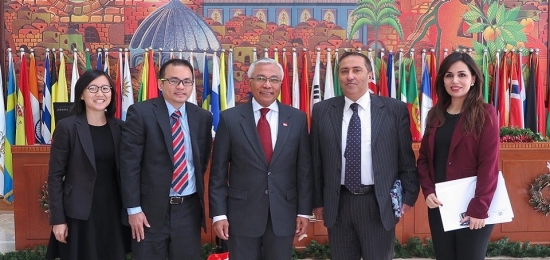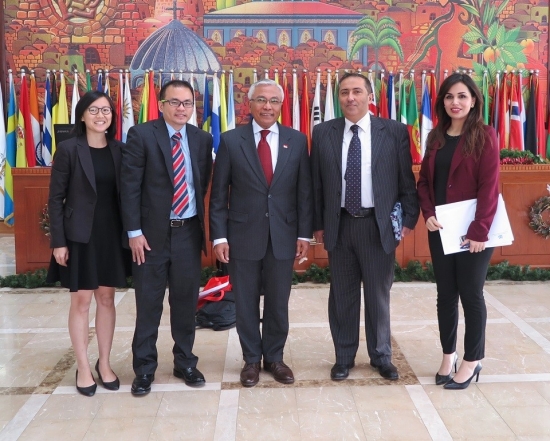01 Feb 2017

TRANSCRIPT OF SINGAPORE’S REPRESENTATIVE TO PNA HAWAZI DAIPI’S INTERVIEW WITH BERITA HARIAN, 26 JANUARY 2017
1. How would you describe your first trip to West Bank as Singapore’s Rep to PNA? How many times have you visited Palestine previously?
I have visited the West Bank four times previously, twice as a journalist at Berita Harian and twice as a Member of Parliament. My first visit was just after the inking of the First Oslo Accords and just after an assignment in Cyprus. I met one of the prominent Palestinian negotiators, Faisal Al-Husseini, and spoke with another, Hanan Ashrawi. This time round, I also met the Chief Palestinian Negotiator, Dr Saeb Erekat. It was good to update myself about developments in the Palestinian Territories, not just in terms of the Middle East Peace Process, but also the political and socioeconomic situation there. The Singapore Government’s decision to appoint a Representative to the PNA sends an important signal that Singapore is serious about engaging the PNA. My recent visit in my capacity as Representative to the PNA to discuss how we can step up our technical assistance for the Palestinian people was well received by the Palestinian Ministers and officials. It has been an instructive experience meeting Palestinians from different walks of life over the past week during my visit. Listening to Ministers, officials and university students, I have gained a better understanding of the difficulties and complexities in trying to achieve peace.
2. What do you think of Singapore's efforts in helping to achieve stability in the region and what more can be done?
Of course Singapore like any other country wants to see peace and stability in the region. We sincerely hope that all sides will continue to work towards a peaceful solution that is in the interests of Palestinians and Israelis and the Middle East as a whole. But the Middle East Peace Process is an extremely complex and protracted one. What Singapore has been doing and will continue to do, is to voice and show our support for the efforts to attain a negotiated two-state solution, one with Israel and Palestine living alongside one another in peace and security. But until such a solution can be achieved, we will support the Palestinian people in their capacity-building efforts, such as offering courses in public administration and advice on developing their vocational education system. These programmes help to prepare the Palestinian institutions for eventual statehood when a final status agreement is reached.
3. What do you hope to achieve as Singapore's representative to the PNA?
My role is to enhance relations between Singapore and the PNA. Under this mandate, my current priority is to coordinate our growing technical cooperation with the PNA. Since we doubled our Enhanced Technical Assistance Package (ETAP) to the Palestinians from S$5 million to S$10 million, as announced by PM Lee in Ramallah last April, we have received a lot more requests by PNA officials to make study visits to or attend courses in Singapore. We welcome the growing interest by the Palestinian side, but we also want to make sure that our ETAP funds are employed effectively and responsibly. This means making sure that proposals for study visits or customised courses are beneficial to the needs of the Palestinian people, and are in areas where Singapore has relevant experience or expertise and where we can make a difference. I intend to make regular trips to the Palestinian Territories, to obtain a better understanding of how we can make our technical assistance for the Palestinians as effective and relevant as possible.
4. What will be the main obstacles to these objectives?
We have been approached by several Ministries and groups in the PNA with a wide range of competing demands for using the ETAP. We have to manage expectations. But I think this is a good problem to have. It shows the strong brand name that Singapore enjoys among Palestinians. Ministers and officials who have visited Singapore shared with me their positive impressions of Singapore. I was also told that soon after the PNA was established, its first President Yasser Arafat said that Gaza should model its development after Singapore. A challenge moving forward is to identify the critical areas in the PNA which Singapore can assist in developing, within our limited resources.
5. What do you think are the other challenges in the role as SG Representative to PNA?
I have not encountered any major issues thus far.
6. Have you received feedback from the community following your appointment as rep to PNA?
When I was first appointed, I was very touched that many people, including complete strangers, came up to me at the mosque to congratulate me on my appointment. Responses to my Facebook posts on my visit have also been very positive.
7. How do you deal with sensitivities from the community with regards to this issue?
I think the community has been very supportive of my appointment. Many think that the appointment demonstrates that even as a small nation, Singapore can extend meaningful assistance to the Palestinian people based on our experiences and capabilities.
8. What do you think of United States' move to abstain from voting on the UN Security Council resolution recently regarding Israeli settlements?
It is a reflection of the international community’s concern over the lack of movement towards peace.
9. How much of a progress is this move and how significant will it be with the new Trump administration coming?
All parties – including the Palestinians and Israelis – are still waiting for greater clarity on the Trump administration’s approach towards the Middle East.
10. What do you personally hope to see in the region and how confident are you about efforts to bring about peace and stability in the region?
During my visit, I had the privilege of meeting Palestinians from different walks of life, different creeds, young and old. My conversations with them have led me to conclude that it is the ordinary people who bear the heaviest burden of the stalled peace process. I am now more convinced about the urgent need to reach a peaceful solution. I hope that the leaders in the region will find the courage to resume negotiations for peace, for the sake of their peoples. In a way, when it comes to peace between Israel and Palestine, optimism and pessimism are almost irrelevant – as Chief Negotiator Erekat said to me, there is no choice but to keep trying.
. . . . .
